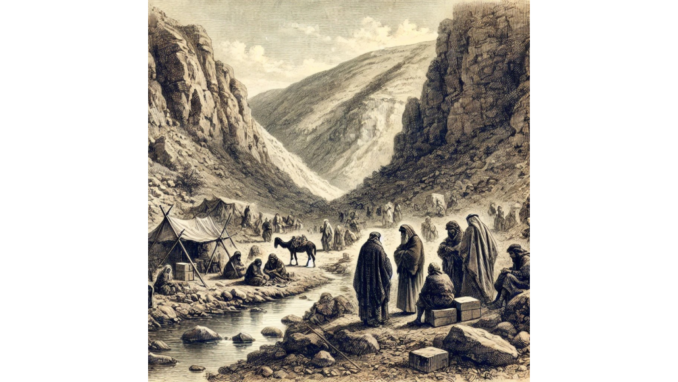
Chatgpt
The sun hung low over the barren hills, casting long shadows across the ravaged land. In the aftermath of the Bar Kokhba revolt, Judea lay in ruin—its cities burnt, its people scattered, its hope smothered beneath the iron heel of Rome. From the ashes of their former lives, the survivors trudged southward, their weary steps carving a path toward an uncertain refuge. Among them was Elazar ben Yitzhak, once a scribe in the great city of Betar, now reduced to a wanderer in search of sanctuary.
Wadi Nisra was not a place of grandeur, nor was it the land of milk and honey promised to their forebears. It was a narrow valley cradled between jagged cliffs, fed by a meager stream that ran thin in the dry months. But it was hidden. And for those who had seen the wrath of Hadrian’s legions, hidden was enough.
As Elazar and his small band approached the valley, they saw others had already arrived—families huddled beneath makeshift shelters of tattered cloth, elders murmuring prayers to the Almighty, children with hollow eyes clutching at their mothers’ robes. They were remnants of shattered communities, Jews and others displaced by Rome’s unyielding march. Nabateans, Samaritans, and even a few Romans who had turned their backs on the empire now gathered in silent desperation.
A figure emerged from the throng, an old man wrapped in a patched woolen cloak. His name was Menahem, a former priest of the ruined Temple, now a shepherd of exiles. He studied Elazar for a long moment before speaking.
“You come seeking a new beginning,” Menahem said, his voice hoarse with age. “You will find no paradise here, only the toil of survival.”
Elazar nodded. “Then it is here we shall survive.”
The wind sighed through the valley, carrying with it the scent of dust and distant rain. In Wadi Nisra, there were no walls, no armies, no decrees of emperors. There was only the land, the labor of their hands, and the unyielding spirit of a people who refused to be erased.
© Roger Mellie 2025
